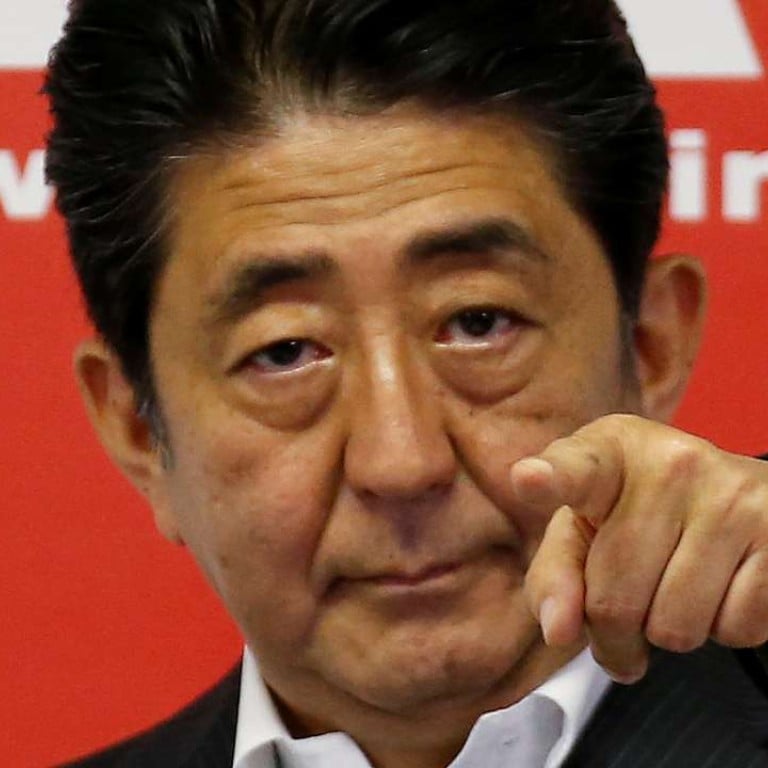
Shinzo Abe downplays poll win that could help remove bar on Japanese troops going to battle
Chinese and South Korean media warn that Japan ruling bloc’s election landslide threatens regional stability
Japan’s Prime Minister Shinzo Abe, seeking to allay concerns he would divert energy from fixing a fragile economy to revising Japan’s pacifist constitution after a big election win, said on Monday changing the charter would not be easy.
Abe’s coalition and allies obtained two-thirds of the seats in the upper house of parliament which, with the ruling bloc’s super majority in the lower house, could allow them to revise the document.
Abe said revising the constitution was his Liberal Democratic Party’s (LDP) cherished goal, but forging agreement on changes in the diverse pro-revision camp would not be easy.
Revisions require a two-thirds majority in both houses of parliament and a majority of votes in a public referendum.
“To realise revision of the constitution is my duty as LDP president,” Abe told a news conference. “But it is not that easy, so I hope debate will deepen steadily.”

Japan’s constitution, imposed by occupying United States forces after the second world war, prohibits the use of aggression to solve international conflicts.
The provisions are popular in the public at large, but reviled by rightwingers like Abe, who see them as outdated and punitive.
Early results from Sunday’s vote show the LDP and its Buddhist-backed allies, Komeito, now occupy more than half - at least 147 - of the seats in the upper chamber of parliament.
With backing from fringe parties that also favour constitutional change, Abe could now have the two-thirds majority that he needs in both houses to push through an amendment to the country’s basic law.

That has sparked concerns in both China and South Korea that Abe’s upper house election victory would be a danger to regional stability, with lawmakers who favour revising the pacifist constitution holding a “super majority”.
China, which Japan invaded before the second world war, is now in a dispute with Japan over the Senkaku Islands (known as Diaoyu in Chinese) and remains strongly opposed to a more activist Japanese defence policy.
“With Japan’s pacifist constitution at serious stake and Abe’s power expanding, it is alarming both for Japan’s Asian neighbours, as well as for Japan itself, as Japan’s militarisation will serve to benefit neither side,” China’s official news agency Xinhua said in a commentary on Monday.
That message was consistent with the official response from China’s Foreign Ministry spokesman Lu Kang who said China and other Asian countries were “highly concerned” about political developments and security policies in Japan, due to its “serious crimes committed” against their people.

South Korea’s major dailies on Monday carried articles on their front pages on Japan’s election result.
The Kyunghyang Shinmun’s article was headlined “Abe gained 162 seats needed to push for constitutional reform.”
“Japan has now entered the path of a country that is able to wage war after discarding its pacifist Constitution it has retained for nearly 70 years after the war,” the daily said in a dispatch from Tokyo.
The election results “are likely to bring about new tense relations in the international community as voices wary of Japan’s tilting toward military power grow louder.”
Another major daily, the Chosun Ilbo, included in its front page an article titled, “Japan’s ability to go war virtually secured needed seats for constitutional reform.”

Forging agreement within Japan’s diverse pro-revision camp on what to change, however, will be a struggle and getting a majority of voters to sign off in a referendum even tougher.
“It’s the first time to have two-thirds in both houses of parliament, but you can’t find any issue on which the two-thirds can agree,” said Gerry Curtis, professor emeritus at New York’s Columbia University.
Some in financial markets worry a focus on the constitution would drain attention from the economy, but Abe promised on Monday to craft a large stimulus package.
Details of the scale and financing of the package remain unclear, though Abe pledged to take “broad, bold” measures to support the economy on June 1 as he announced a delay to a planned sales-tax increase. Abe said that Tuesday he will order ministers to begin compiling the stimulus package. One of his advisers has said that should be 20 trillion yen ($199 billion) in the current fiscal year.

Doubts about Abe’s policies persist even though his ruling bloc won big in terms of the number of seats. Many voters felt they had no other option, given memories of the main opposition Democratic Party’s rocky 2009-2012 rule. Others stayed home.
Surveys show many Japanese voters are wary of changing the constitution’s war-renouncing Article 9, which advocates see as the source of Japan’s post-war peace and democracy. Conservatives see it as a symbol of humiliating defeat.
If taken literally, Article 9 bans the maintenance of armed forces. Successive governments have interpreted it to allow a military for self-defence, a concept Abe last year stretched to allow Japan’s military to aid friendly nations under attack.
Formal revision of Article 9 would likely be largely symbolic - though nonetheless historic.
Convincing the Komeito party, the dovish junior partner in Abe’s LDP-led coalition, to agree would be challenging. The pro-revision camp might therefore tackle another amendment first.
One possibility is a clause giving the government more power in a national emergency, a move critics say would curtail civil rights.

Another option, floated by the Komeito, would be to add an environmental protection clause. That less contentious step would nonetheless break the political taboo on revision.
It is unclear whether that would satisfy Abe’s political base.
“Conservatives see the constitution as emasculating the nation,” said Jeffrey Kingston, director of Asian studies at Temple University in Tokyo.
“If I’m in his camp, I’m thinking, this may be my best shot.”
Additional reporting by Kyodo and Bloomberg

